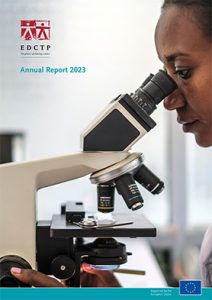EDCTP Annual Report 2023: two decades and beyond
Twenty years since its launch, the EDCTP programmes have established a model for how equitable research partnerships should operate. This ‘partnership of equals’ covers both the governance of the programme – where European and African partners have equal status – and in the operations of individual partnerships. EDCTP has funded partnerships that have advanced multiple interventions against poverty-related diseases affecting sub-Saharan Africa. It has also made critical contributions to the development of research capacity in the region, particularly through its comprehensive fellowship programme. The EDCTP Annual Report 2023 reflects on the major achievements and progress made during the first 20 years of the EDCTP programmes while looking towards the future. It also highlights the Eleventh EDCTP Forum and features the main highlights of last year.
“I am very happy that the EDCTP Association and the Global Health EDCTP3 Joint Undertaking are working together to further expand and strengthen this partnership. The EDCTP2 programme has created a springboard that is providing its successor, the Global Health EDCTP3 programme, with a running start.”
Henning Gädeke, Chair of the Board of the EDCTP Association
“One of our objectives in 2023, as we entered the closing phase of the EDCTP2 programme, was to provide more support to ongoing projects, including operational and financial management support to EDCTP-funded beneficiaries, as they complete their studies and disseminate their findings.”
Abdoulie Barry, Acting Executive Director & Director of Finance and Administration
Highlights of the EDCTP 2023 Annual Report include:
Eleventh EDCTP Forum and 20th anniversary
- Celebrated the 20th anniversary of EDCTP in Paris during the Eleventh EDCTP Forum, where more than 1,000 delegates gathered to present results of their projects and network.
Progress in malaria prevention
- A second malaria vaccine, R21/Matrix-M, supported through a phase II study by EDCTP, has been recommended by WHO and will help to meet strong regional demand for malaria vaccination.
- Two EDCTP-funded studies have shown that a new antimalarial, dihydroartemisinin piperaquine (DHP), is safe to give to women living with HIV to prevent malaria infections during pregnancy.
Major advances in treatment of HIV-related disease
- A simplified drug formulation for treatment of fungal meningitis in people living with HIV is effective and safer than the current treatment.
- A new care pathway for people living with HIV with suspected CNS infections has been found to halve mortality rates.
New clues to TB immunity
- An EDCTP Senior Fellow has identified a type of T cell that may play a key role in protection against TB disease, with potentially significant implications for TB vaccine development.
New treatment options for neglected infectious diseases
- EDCTP-funded studies have generated the evidence to support:
- The use of a new version of praziquantel suitable for young children
- The extension of fexinidazole use to treat acute forms of sleeping sickness
- The use of an albendazole–ivermectin fixed-dose combination to provide children with protection against a wider range of soil-transmitted helminths.
Stronger national systems for oversight of clinical research
- EDCTP-funded projects have contributed to significant strengthening of ethics review and regulatory bodies in multiple countries in sub-Saharan Africa.
A meeting of EDCTP fellows
- Two pre-Forum meetings examined the contribution of the EDCTP2 fellowship programme to capacity-building.
A collaborative approach to clinical trial capacity-building
- EDCTP continued to work with other funders to explore how best to strengthen clinical trial capacity in sub-Saharan Africa and achieve World Health Assembly Resolution WHA75.8.

